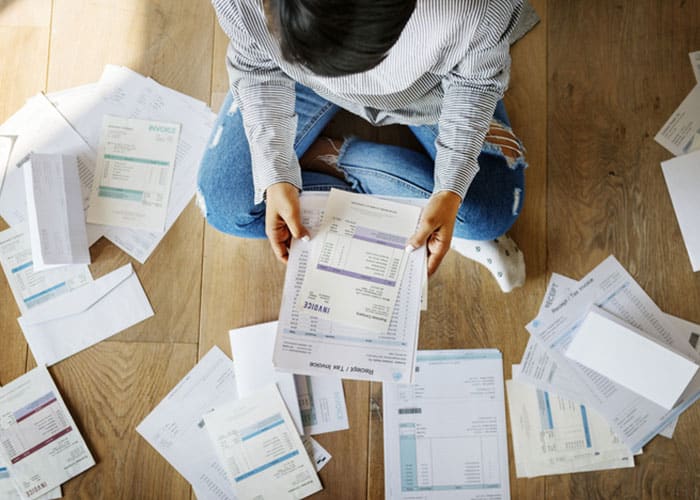Wondering what information is required on an invoice? We take stock so as not to forget anything.
The invoice, as proof of a commercial transaction, details a service or goods sold. But to be valid, it must include certain mandatory information. In the absence of essential information, the professional then risks a fine. To avoid falling under the law, find out what information is required on an invoice. And also follow our advice to establish invoicing in the rules of the art. We tell you everything so you don’t make mistakes in your accounting.
Summary
Mandatory information on an invoice
Here is the list of general mandatory information on an invoice, according to article L441-9 of the Commercial Code:
- date of issue of the invoice;
- invoice numbering. It is a unique number based on a continuous, unbroken chronological sequence;
- date of sale or provision of service;
- identity of the buyer (name or corporate name, address of the registered office, billing address if different from the registered office);
- identity of the seller or service provider (name or company name, RCS number for a trader followed by the name of the city where the registration office is located, number in the directory of trades for a craftsman, address of the head office, mention of the form legal status for the company and amount of share capital);
- number of the purchase order drawn up by the buyer (mandatory mention since 1er October 2019);
- individual VAT identification number of the seller and the professional customer from 150 euros excluding tax;
- designation of the product or service;
- detail in quantity and price;
- catalog price or unit price excluding VAT;
- possible price increase;
- legally applicable VAT rate;
- price reduction (discount, rebate, etc.);
- total amount to be paid excluding tax (HT) and all taxes included (TTC);
- date on which payment must be made (discount conditions, penalty rates, amount of lump sum compensation for recovery in the event of late payment).
To know : if the company is in the process of being registered, the invoice drawn up must be in the name of the company, with the mention “Siret in the course of attribution”. Do not establish the invoice in the name of the creator because the deduction of VAT will be rejected. In the case of an individual, the SIRET or SIREN number is not required.
Fines for forgetting the mandatory information on an invoice
If, when drawing up its invoice, the company does not comply with the legal obligations, it is liable to:
- a tax fine of 15 euros per missing or inaccurate statement. And this, for each invoice, capped at ¼ of its amount;
- a fine of 75,000 euros for a natural person and 375,000 euros for a legal person. In the event of non-invoicing, convenience invoices or fictitious invoices, the fine may be doubled.
What should be put on an invoice sent to a professional? Mandatory particulars.
When your invoice is sent to a professional, certain information is mandatory:
- the date or deadline for payment, i.e. the date on which payment must be made. The invoice must also specify the discount conditions in the event of advance payment. If there is no discount, then mention on the document “Discount for advance payment: none”;
- the rate of late payment penalties payable in the event of non-payment on the payment date. Note that late penalties are payable without the need for a reminder;
- mention of the lump sum indemnity of 40 euros for recovery costs, in the event of late payment.
What are the particular mentions to remember on an invoice?
In certain situations, additional information must appear on an invoice:
- « Member of an approved association, payment by check and bank card is accepted » if the seller or service provider is a member of a management center or an approved association;
- “VAT not applicable, art. 293 B of the CGI” if the seller or service provider benefits from the VAT-based franchise (micro-entrepreneur, for example). The invoice is then expressed excluding tax (HT);
- « reverse charge » if work is carried out by a building subcontractor on behalf of a principal subject to VAT, the subcontractor no longer declares the VAT and it is the main company that declare it;
- mention of the insurance taken out for the activity, the contact details of the insurer or the guarantor, the geographical coverage of the contract or the guarantee for craftsmen or micro-entrepreneurs carrying out a craft activity and for whom professional insurance as the ten-year guarantee is mandatory.
What form must the invoice take to be valid? The case of the electronic invoice
The rules to follow: language, number of copies
An invoice must also meet a certain number of obligations in terms of form:
- be written in French;
- be drawn up in two copies, the original of which will be given to the customer;
- include the mandatory information detailed above.
Billing in a foreign currency or language: conditions
Note that a company established in France can invoice in a foreign currency provided that the foreign currency is internationally recognized and convertible (eg: dollar, pound sterling, etc.). And the reintegration into the company’s accounts must be carried out in euros.
On the other hand, if ever the invoice is established in a foreign language, the Administration can require the translation certified by a sworn translator, to carry out a control.
The electronic or dematerialized invoice: an obligation ?
Then, note that the invoice can be issued by dematerialized way, electronically provided that the buyer accepts this form.
But in all cases, the content of an electronic invoice must correspond to that of a paper invoice and include all the mandatory information.
Moreover, in the context of public procurement, electronic invoicing is now mandatory for large companies, SMEs and VSEs (from 2020).
Finally, with regard to the conservation of invoices, it is of the order of 10 years. It is an accounting document that can be kept in paper or electronic format.
Read also : How long to keep invoices?




